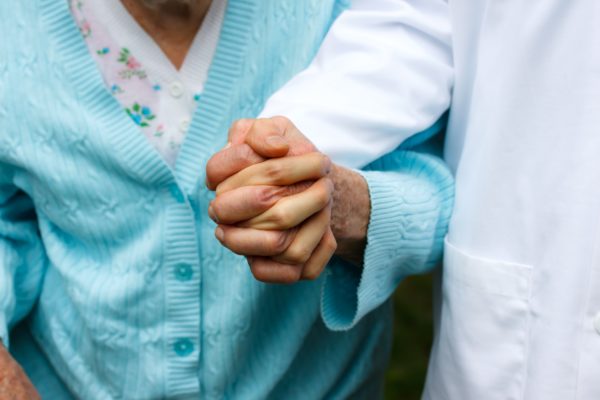Alzheimer’s disease is a neurological disorder which gradually destroys or impairs the individual’s brain cells. It creates problems in thinking, remembering, and the ability to perform what once were simple tasks such as taking a bath, driving a car, or writing a check. Alzheimer’s disease affects more than four million persons. Most are 65 years of age and older with a dramatic increase in the incidence of the disease in the 80-plus population. A significant number of persons in their 40’s and 50’s are also affected. Alzheimer’s affects men and women, touches all ethnic groups, and crosses all geographic boundaries. It has no regard for a person’s education, intelligence, or previous life style. Good health is important but does not prevent or slow the course of the disease. Good health is, of course, important, to the individual’s over all ability to function. Though the behavioral symptoms appear psychiatric, Alzheimer’s is a physical disease. It is not contagious. It is diagnosed by ruling out other conditions which present similar symptoms. However, a clinical diagnosis can be confirmed only upon autopsy.
 There are many conditions which cause serious memory loss or confusion in older adults, some of them treatable and, in some cases, reversible. Memory loss which seriously impairs the person’s ability to function is not a normal part of aging and should be evaluated by a physician.
There are many conditions which cause serious memory loss or confusion in older adults, some of them treatable and, in some cases, reversible. Memory loss which seriously impairs the person’s ability to function is not a normal part of aging and should be evaluated by a physician.
Alzheimer’s is a progressive disease. The patient gets worse over time. Symptoms may begin with a simple loss of memory and progress to a stage where the person has a complete loss of physical function, ability to communicate, or ability to interact with his environment or those around him. He will need complete care.
There is no cure or treatment at this time for the person with Alzheimer’s disease. However, much can be done to support or enhance the person’s remaining abilities. Behavioral symptoms such as wandering, eating difficulties, sleep problems, hallucinations or combativeness become stressful caregiving tasks without an understanding of the disease and how it makes the person behave. Family and professional caregivers become physically and emotionally overwhelmed without training in caregiving skills specific to the Alzheimer’s patient. The stages listed below are provided as a guide to understanding how the disease affects the patient:
Stages of Progression in Alzheimer’s Disease
Early Stage: In this stage there are very subtle, sometimes difficult to recognize changes in the person. There may be mood and personality changes which cause an easy going person to become irritable and unpredictable; problems in doing everyday tasks such as remembering to pay bills, preparing a meal; or finding one’s way around in a familiar neighborhood. The person often shows poor judgement or may have problems making decisions. Family and friends may notice increased forgetfulness, especially for things which just happened. This can be confusing because the person often can remember very well things which happened a long time ago. This early stage may last 2-A years. With support, the individual in this stage will continue to function well in the community. You will not see an individual in this stage in the nursing home.
Middle Stage: This is the longest stage and often presents the greatest caregiving challenge. Many of the patients you care for will be in this stage. This stage may last 2-10 years or more. Many of the patients will be fully dependent on you and may need constant supervision. The patient may:
- become more forgetful and confused about where he is and he may not recognize family, friends, or you. -ask the same question over and over because he can’t remember your answer or that he asked the question before.
- hide things and accuse you of stealing them. -seem thoughtless and self-centered.
- behave inappropriately by cursing, hitting others, or rummaging through other patient’s belongings. -may pace aimlessly or try to leave the facility.
- see or hear things that are not there. -have problems with using language.
- need help with bathing, toileting, and other self- care tasks.
Final Stage: This is the terminal stage of the disease and generally lasts 1-3 years. The patient is bedridden and becomes completely dependent for personal care. Often the patient is unable to communicate with words. He may not recognize himself or others and seems unaware of his environment. Characteristics may include: immobility, increased risk for infection, seizures, incontinence, eating difficulties, dehydration. The patient is usually immobile at the end of the final stage. The patient may drift, into stupor, coma and then death.
 By Micha Shalev
By Micha Shalev
Micha Shalev MHA CDP CDCM CADDCT is the owner of The Oasis at Dodge Park, Dodge Park Rest Home and The Adult Day Club at Dodge Park as well as Dodge Park at Home located at 101 and 102 Randolph Road in Worcester. He is a graduate of the National Council of Certified Dementia Practitioners program, and well-known speaker covering Alzheimer’s and dementia training topics. He can be reached at 508-853-8180 or by e-mail at m.shalev@dodgepark.com or view more information online at www.dodgepark.com


